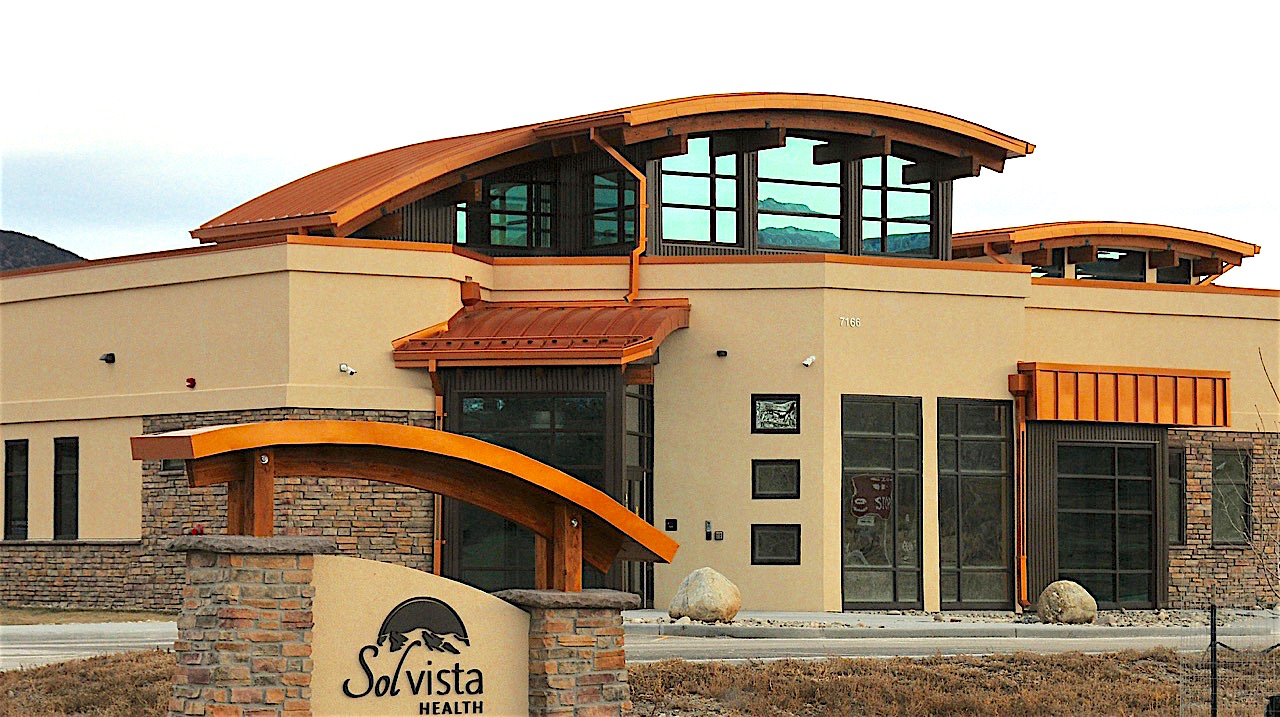
Solvista Health’s Regional Assessment Center on the Heart of the Rockies Regional Medical Center Campus. Dan Smith photo.
The Solvista Health Regional Assessment Center on the Heart of the Rockies Regional Medical Center Campus is already helping patients and looking to expand in the new year. It held its “official” grand opening last May, and has been ramping up services since then.
Executive Director Brian Turner, in a recent interview, said a director, Julie Anderson, has been in place for some time.
“We are working hard … we’re still hiring and looking for more folks to come work at the Regional Assessment Center,” said Turner, “but we are seeing folks and it’s been going well providing some great help to community members from all over the region.”
“Law enforcement is regularly transporting folks to us, so that they can drop them off at a dedicated access sally port that we have…and we’re taking from there, getting people the help that they need,” he added.
One of the priorities being worked on now, Turner pointed out, is the state has created a new rule structure for secure transportation for behavioral health incidents; individuals who are having a mental health crisis and need transport to a different level of care.
“The counties are working on creating the licensing structure; so the state issues the rules, and then the counties are responsible for creating the local licensing structure,” he said, not unlike how a local taxi service would be established, albeit with different rules and requirements.
Those rules are expected to be established in January in the Solvista Health center’s four-county service area (Chaffee, Fremont, Lake, and Custer along with Park).
But, he noted, the Assessment Center’s impact footprint is larger than the four-county area.
“The Regional Assessment Center is a resource for anybody, so even though we’re not the mental health center assigned to other counties, we work really closely with these other counties and make sure they know they’ve got access to our center resource as a regional resource for everybody,” said Turner.
“We really try to serve as this regional hub, where we are connecting to all of the other resources, not just about what we can provide under that roof, but making sure we’re getting people connected to care, and that might be at Solvista, but it also might be with other resources that they’ve got in the community that they’re coming from, so we’re really well connected to the Medicaid program in this part of the state …”
The state of Colorado is taking steps to try to meet identified critical needs in this arena.
“The state has its new behavioral health administration and we’re really well connected to them,” he added. “So that if somebody is coming in from, say, Summit County — or they happen to be passing through [our four-county area] when they need access to our care but they’re from Denver — we can network and work with other providers to get them support for the long term. We just don’t want to help in the moment of crisis, we also want to help get them connected to things that can help prevent the next crisis.”
Turner says he feels, like other professionals do as well, that the state is turning a page on mental health care.
“Colorado is in a great place right now, where we’re really transforming the system to be a more complete one, where we can get people a lot of different types of care. We can coordinate that in a way that meets maybe all of their needs, because so many things are happen at the same time, right?” he said. “You might have a mental health and a substance use issue, and those things could be related to a physical health challenge that you’re having right?… they could be related to financial stress or housing stress you’re having. If we think about treating just one of those elements, and only one, we’re probably not going to have as great an outcome as we would if we’re thinking about treating the whole person and all of the needs.”
The greatest immediate need locally is, of course, trained staff workers.
An entry-level category called ‘behavioral health worker’ does not require a college degree or a clinical license. The new assessment center then provides training in-house and in some cases, in partnership with entities such as College Mountain College.
“It’s for folks who have a passion for the work, who want to grow and have a kind of career in behavioral health,” said Turner. “It’s a great starting point, and of course, since we’re covering shifts 24/7, there’s just a lot of need to make sure we have a deep bench of people who can be there to provide care.”
When it comes to the clinical positions, Turner said that Solvista is always hiring licensed behavioral health providers, but is fairly well staffed in that category compared with the entry-level needs.
While there are concerns about available housing and affordability challenges as has been experienced by other health providers and other professions, Turner explained “If we can find folks that are here in the community, who really want an opportunity to get into this industry and have kind of a whole career pathway in front of them we can support and provide training to get them along that pathway. That’s what we’re looking for and we want to get that message out far and wide.”
People interested in checking out the opportunities at Solvista can visit the website: Solvistahealth.org.








Recent Comments